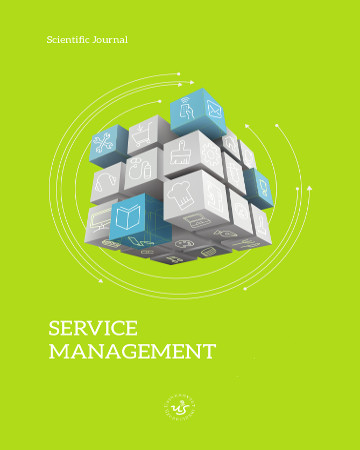
ISSN: 1898-0511
eISSN: 2353-2858
OAI
DOI: 10.18276/smt.2015.15-06


Issue archive /
Vol. 15, 1/2015
Hotel promotion as viewed by customers
| Authors: |
Izabela
Kapera
University School of Physical Education in Krakow |
| Keywords: | promotion customer ratings Internet hotel industry |
| Data publikacji całości: | 2015 |
| Page range: | 7 (49-55) |
Abstract
Purpose
The purpose of the paper is to discuss the significance of hotel promotion from the customer perspective. The research analyzed hotel promotional efforts from the perspective of hotel guests staying at randomly selected hotels in Poland.
Design/methodology/approach
The data were collected using a questionnaire consisting of 21 questions on the determinants of hotel choice, hotel guest rating of hotel promotional efforts, role of the Internet in hotel promotion, and hotel recommendations. A total of 273 Polish hotel guests were surveyed about their hotel preferences.
Findings
Research has shown that key factors determining the choice of hotel include location, quality, and price. Eight percent of survey participants also noted that promotional efforts did make a difference in their choice of hotel in Poland. The research also confirmed the growing role of the Internet in promotional efforts. As much as 64.1% of survey participants indicated that the Internet is their primary source of information on hotels in Poland. The effect of hotel chains was also assessed in relation to the abovementioned parameters. The highest customer ratings of hotel promotional efforts were observed for domestic hotel chains and the lowest for international hotel chains.
Practical/social implications
An understanding of customer perspective with respect to hotel promotions is useful in terms of developing the total offering for each given hotel in order to build competitive advantage Originality/value
The papers presented some interesting issues about hotel promotion from theoretical and practical perspectives. This paper discusses the significance of hotel promotion from the customer perspective.
Download file
Article file
Bibliography
| 1. | Bhagwat, Y. N. & DeBruine, M. (2008). Uspjesnost oglasavanja u hotelskoj i turistickoj industriji. Advertising efficiencies in the hospitality and tourism industry. Acta turistica. 20 (2008):200-218. |
| 2. | Chan, E. S W. & Wong, S.C. K. (2006). Hotel selection: When price is not the issue. Journal of Vacation Marketing. 12(2):142-159. |
| 3. | Chen, L. Lin, S. & Kuo, C. (2013). Rural tourism: Marketing strategies for the bed and breakfast industry in Taiwan. International Journal of Hospitality Management. 32 (2013) 278–286: 278-286. |
| 4. | Cheung C.& Law, R. (2002).Virtual MICE Promotion: A Comparison of the Official Web Sites in Hong Kong and Singapore. Journal of Convention & Exhibition Management. 4(2) 2002: 37-51. |
| 5. | Chitu, I. B. & Albu, R. G. (2013). Aspects regarding the use of Facebook within the hospitality industry – a case study in Romania. Bulletin of the Transilvania University of Braşov . 6 (55), No. 1 – 2013, Series V: Economic Sciences:97-102. |
| 6. | Christou, E. (2011). Exploring online sales promotions in the hospitality industry. Journal of Hospitality Marketing & Management. 30, 7: 814–829. |
| 7. | Christou, E. (2013). Exploring brand confusion through hotel adverts. Tourismos An International Multidisciplinary Journal of Tourism. 8 (3): 151-163. |
| 8. | Clark, J. D. & Dotson, M. J. (2004). The impact of promotions on hotel decision choice: a demographic study”. Journal of Hospitality & Leisure Marketing. 2/3: 81-95. |
| 9. | Datko, M. (2008). Wskaźniki pomiaru skuteczności i efektywności wydarzeń promocyjnych. Avaliable at: wsp.pl/file/56_946083143.pdf [accessed 10.07.2015]. |
| 10. | Ariel, M. (1999). Marketing practice in small tourism and hospitality firms. Journal of Tourism Research. 1(2): 97-109. |
| 11. | Han, J. H. & Mills J.E. (2006). Zero acquaintance benchmarking at travel destination websites: What is the first impression that national tourism organizations try to make? International Journal of Tourism Research. 8: 405-30. |
| 12. | Huang, J. (Zhuowei) & Cai, L.A. (2010). Online Image of Multinational Hotel Brands on Different Language Platforms. Journal of China Tourism Research. 6 (3): 279-295. |
| 13. | Ip, C.& Law, R. (2011). A review of website evaluation studies in the tourism and hospitality fields from 1996 to 2009. International Journal of Tourism research. 13(3): 234-265. |
| 14. | Kotler, P. Armstrong, G. Sunders, J. Wong, W. (2002). Marketing, Podręcznik europejski. Polskie Wydawnictwo Ekonomiczne. Warszawa. |
| 15. | Kotler, P., & Armstrong, G. (2011). Principles of Marketing. Pearson Prentice Hall. |
| 16. | Low, R. & Ng, C. (2011). Marketing Strategies for Small Hotels: The Case of Cheung Chau in Hong Kong. Asia Pacific Journal of Tourism Research. 16(1): 21-38. |
| 17. | Lubetkin, M. (1999). Bed-and-breakfasts: Advertising and promotion. Cornell Hotel and Restaurant Administration Quarterly. 40(4): 84-90. |
| 18. | Primorac, D. Smolić, M.& Bohomolec, M. (2012). Internet use as a part of business strategy in small hotels in the Republic of Croatia. Megatrend Review, 9 (1) 2012: 317-328. |
| 19. | Ruzic, D. Andrilic, B. & Ruzic I. (2011). Web 2.0. promotion techniques in hospitality industry. International Journal of Management Cases, Special Issue: CIRCLE Conference. 310-319. |
| 20. | Stewart, K. L. & Barr, J. (2005). Promotional Methods Used by Hospitality-Related Firms in Close Proximity to Pennsylvania Rail-Trails. Journal of Hospitality & Leisure Marketing. 13(2) 2005: 55-65. |
| 21. | Taylor, D. (2001). Hospitality Sales and Promotion: Strategies for Success (Professional Hospitality Guides). Butterworth Heinemann, Oxford. |
| 22. | http://www.statista.com/statistics/273018/number-of-internet-users-worldwide |